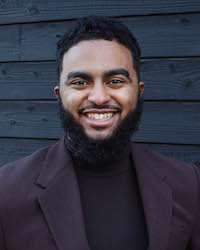Shane D. Nelson G’19 says while attending Syracuse University he redefined his personal mission, in large part because the School of Education’s higher education M.S. program is so focused on self-reflection. “I always say that my mission on this planet is to create access and opportunities for others by making intentional connections to sustainable resources.”
 After graduating in 2019, Nelson worked at the Community College of Philadelphia in the Center for Male Engagement. There he met with men of color across campus, at any point in their academic and personal journey, to help navigate life. A major focus was workforce development. “I started to notice that the gig economy, in particular, was selling my students entrepreneurship without ownership, and then employment without benefits,” he says.
After graduating in 2019, Nelson worked at the Community College of Philadelphia in the Center for Male Engagement. There he met with men of color across campus, at any point in their academic and personal journey, to help navigate life. A major focus was workforce development. “I started to notice that the gig economy, in particular, was selling my students entrepreneurship without ownership, and then employment without benefits,” he says.
Nelson’s next move was to secure funding to pay students to work across the country—during peak pandemic time—and follow their passions. He’s now pursing his passion by serving as both the managing director of P4 Hub (a DiverseForce company)—a curated membership of BIPOC leaders working around a vision of advancement—and he co-runs Reify Solutions, a consulting firm he launched with his wife Taylor Cobb. Reify helps clients execute strategic plans to improve outcomes.
Drawing from his graduate degree, Nelson says he’s weaved the theory he learned at the School of Education into his everyday professional practice. His next step is to purse a Ph.D. and continue to nurture his personal vision for his company.
How do you utilize your SU degree in your current role?
I’ve used higher education research for the initial concept of the P4 Hub with my mentor Sulaiman Rahman. So I use my degree pretty much every day—in my research, facilitations for private clients, and to coordinate focus groups.
From time to time, I must sit down with the complex organizational structures and use all of the thinking and research skills I got at SU—and really utilize social science scholarship—to help bring clients’ ideas to life. By cultivating ecosystems, I help diversify talent pipelines to ensure all individuals have access to family sustaining jobs.
What elements of the M.S. program in Higher Education particularly interested you?
I was drawn to Syracuse’s program based off reflections I heard from mentor Eddie Banks-Crosson, who formerly worked at the University. He said, “Listen, this is the program that’s going to help elevate you in student affairs. They’re going to challenge you. They’re going to push you to grow, and you’re going to enjoy it.”
After my first open house where everyone was so welcoming and so warm, I felt a real connection with the faculty and staff of the program. Additionally, the privilege of the GA experience helps you dodge a lot of student debt, which was definitely a bonus.
If you had to pick one strategy you use most to help students and colleagues, what would it be?
I think the spark is ownership; ownership in the form of accountability. The biggest thing that anyone—a student, a client, or a multi-national conglomerate—can convey is accountability.
Accountability is ownership of the thing that you can control. That definition—ownership of the things I can control—makes it internal. It helps you understand where some of your unseen challenges are, such as implicit bias. It also helps you understand what power you have in a situation and how you can lend that power to someone else in order to go from “power over” to “power with.”
With Reify, our method has always been to use coursework, coaching, and action planning to move clients forward. The action plan really helps you see that diversifying the workforce can be on your own terms and in your own words. From a workforce development standpoint, I always think about how we’re weaving in accountability.
What does your next year look like?
In the fall, I’ll attend Temple University to purse a Ph.D. in policy and organizational studies with a concentration in higher education. I will continue to serve as the Managing Director of the P4 Hub and run my company. I think this is where I’m the most excited because every system has been built, refined, and tested to really automate and scale social impact.
Looking further ahead, I want to spread different aspects of my work around the country by bringing solutions to new markets. I will continue to serve. I think the next five years will look consistent, scaled, and really relaxing, because once the systems are built and in place, I can put people who are better at refining and advancing those systems into those opportunities. This frees up more time for meditation and growth, and it gives someone else access to an opportunity.
By Ashley Kang ’04, G’11 (a proud alumna of the M.S. in Higher Education program)
Learn more about the master’s degree in Higher Education, or contact SOE Graduate Admissions at soeadmissions@syr.edu.
